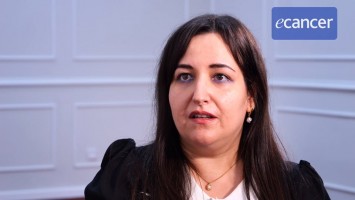BACR & ECMC: Therapeutic interventions for cancer prevention
Chemoprevention of platelet crosstalk in cancer
Prof Carlo Patrono - Catholic University School of Medicine, Rome, Italy
I’m talking about the potential mechanism through which aspirin may prevent cancer and, in particular, colorectal cancer. The ideas I’ve been developing during the past few years are that given the low dose requirement for these apparent anti-cancer effects the same mechanism of action that explains reduced risk of cardiac problems may also underlie the protection against colorectal cancer because there is evidence that platelets may participate in two different ways, one in the early stages of cancer development by interacting with local adjacent resident cells of the colorectal mucosa, perhaps at sites of mucosal injury and release during platelet activation a number of mediators that can feed downstream responses in adjacent nucleated cells triggering their proliferation and transformation, inhibiting apoptosis, promoting angiogenesis.
The other way in which platelets may have a role is in their crosstalk with cancer cells. Once cancer cells are formed and circulate, platelets interact with cancer cells and cancer cells may activate platelets, platelet activation surrounding cancer cells may shield circulating cancer cells from NK cell attack and immune recognition. Platelets crosstalking with cancer cells may enhance the metastatic potential of cancer cells by triggering a phenotypic switch towards stem cell-like cells.
Can you tell us about the molecular pathways that manage that communication?
If you’re talking about platelets the primary molecular target would be cyclooxygenase 1 which is the only COX isoform present in human platelets, at least in mature human platelets. The dose requirement for these anti-cancer effects that have become apparent in both pharmaco-epidemiology and clinical trials of aspirin, the dose requirements are consistent with the dose requirement for inhibiting platelet COX-1 activity and thromboxane biosynthesis in platelets.
Can you tell us more about the serine residue (Ser529)?
It’s a very unique mechanism that distinguishes aspirin from all the other non-steroidal anti-inflammatory drugs. So all the other NSAIDs simply compete with the substrate for binding arachidonic acid, for binding to a common docking site within the cyclooxygenase channel. Aspirin does the same thing initially but then acetylates the single serine 529 and through the group of acetylsalicylic acid blocks or obstructs the cyclooxygenase channel in its narrowest portion and therefore interferes with arachidonic acid moving up the channel to reach its catalytic site.
How do you manage platelet recruitment?
If you’re talking about primary prevention, if you add up the cancer prevention benefit with the cardiovascular benefit, these two together will outnumber an increased risk in major GI bleeding by a factor of three to five and Peter Rothwell has shown some data this morning addressing this very issue. Also the time course seems to be different, you tend to see these upper GI bleeding events appearing early on and then apparently the risk decreasing or disappearing while with the cancer benefit you seem to be increasing the benefit as you progress with more prolonged therapy.
How could aspirin be brought into wider use?
I guess it depends on several factors, one is the acceptance by the medical scientific community which seems to be growing. The second is a regulatory review of the existing evidence which hasn’t yet been publically announced. Thirdly is treatment recommendations by independent organisations and so far there is only one organisation that has explicitly mentioned prevention of colorectal cancer in the treatment recommendation for aspirin in primary prevention of cardiovascular disease. This is the United States Preventive Services Taskforce, therefore the first time a few months ago has issued a new treatment recommendation for aspirin where they say that for certain people they recommend using low dose aspirin for preventing cardiovascular disease and colorectal cancer.
Any final thoughts?
We should spend more money in research on aspirin and cancer.








